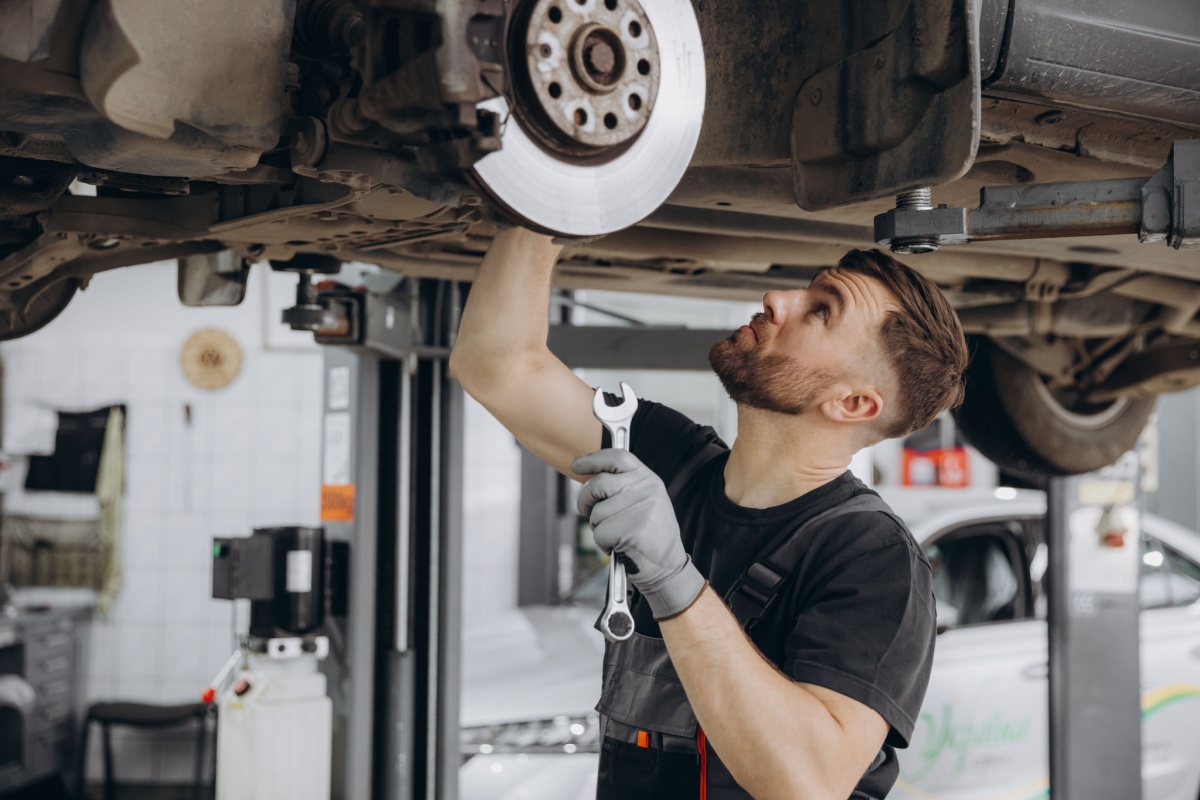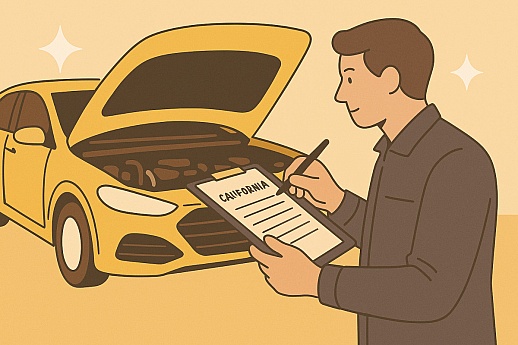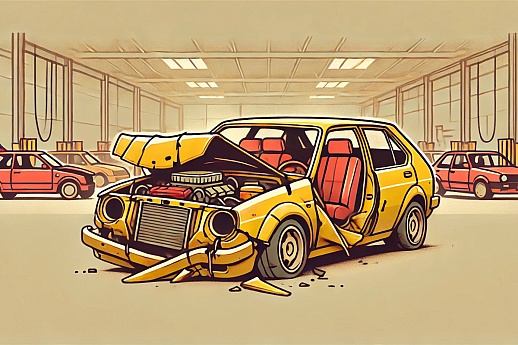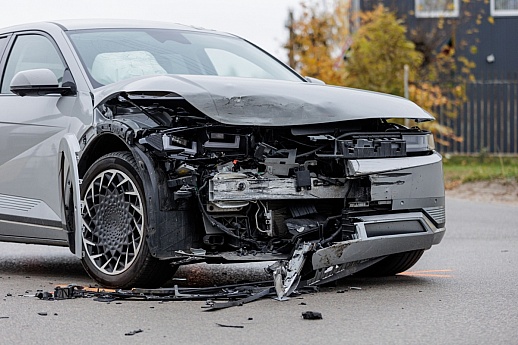Why Is My Car Squeaking? Common Causes, Fixes, and Repair Costs
Wondering why is my car squeaking as you roll down the road? That high-pitched noise often signals a worn or loose part, from dry suspension bushings to a slipping serpentine belt. The good news is that many squeaks can be traced quickly and fixed for less than $500. Read on for common causes, safety tips, and when to call a mechanic.
Why Is My Car Squeaking?

That telltale chirp under the hood or around the wheels often starts as a minor irritation. However, it’s your car’s way of letting you know something needs attention. From worn bushings that dry out over time to belts losing their grip, moving parts can begin rubbing or slipping and create that high-pitched squeal. Use the checks below to pinpoint where the noise might be coming from before a small fix turns into a major repair.
Worn Suspension or Chassis Parts
Over time, parts like shocks, springs, and rubber mounts dry out or wear down and start to squeak when you go over bumps or turn.
- Look for cracked or flattened rubber pieces under the car.
- Lubricate pivot points with silicone spray.
- Replace any parts that look badly worn or damaged.
If you keep hearing a squeaking noise when driving, have a shop inspect the suspension — worn ball joints or bushings can affect handling and safety.
Average Repair Cost: Replacing a shock or strut typically runs between $1,015 and $1,222, with labor around $303 to $445 and parts up to $777.
Loose or Worn Engine Belts
The belt that powers your alternator, power steering, and A/C can slip or crack and make a loud squeal.
- Inspect the belt for cracks, fraying, or shiny spots.
- Check tension; if it feels loose, it may slip under load.
- Replace any belt that shows damage, and ask a mechanic to check the pulleys.
A loose or glazed belt squeaks more in cold weather. If new belts still shriek, have a professional check the tensioner and pulleys.
Average Repair Cost: A serpentine belt replacement usually costs from $143 to $200, including labor of up to $124 and parts between $59 and $77.
Bad Wheel Bearings
Wheel bearings let tires spin smoothly. When they wear out, you may hear a growl or screeching sound when driving that changes with speed or when turning.
- Lift the car and spin each wheel by hand. Feel for roughness or grinding.
- Listen for noise that gets louder as the wheel spins faster.
- Replace any bearing that feels rough. Driving on a bad bearing can eventually lead to wheel separation or loss of control.
Have a mechanic replace worn bearings promptly to avoid more serious damage.
Average Repair Cost: Wheel bearing replacement averages between $347 and $500, with labor up to around $330 and parts from $122 to $171.
Dry or Damaged Drivetrain Joints
Parts that transfer power to the wheels, like CV joints (front-wheel drive) or U-joints (rear-wheel drive), need grease. If a boot cracks or leaks, the joint squeaks or clicks, especially when turning.
- Look under the car for torn rubber boots and grease splatter.
- Lubricate lightly if the boot tear is minor.
- Replace the joint or boot if grease has leaked out.
Driving on a failed joint can lead to loss of power or control.
Average Repair Cost: Replacing a CV axle runs to about $1,325, with labor between $201 and $295 and parts from $910 to $1,030.
Tires, Alignment, and Road Debris
Sometimes the squeak isn’t a part at all, but your tires or a stuck object.
- Check tire pressure and inflate to the proper level.
- Inspect the tread for uneven wear. Misalignment can cause squeals.
- Remove any stones, leaves, or debris stuck near the brakes or fender.
If the tires and wheels check out but the noise persists, get a professional alignment and brake inspection.
Average Repair Cost: A standard wheel alignment falls between $189 and $277.
General Tips
Catching a nagging noise early can save you from bigger headaches down the road. Try these simple upkeep habits to keep your car quiet, dependable, and in great shape:
|
Tip |
Benefit |
|
Keep a noise log |
Record when and where squeaks occur, including date, mileage, and driving conditions, to help pinpoint intermittent issues quickly |
|
Schedule professional inspections every six months |
Have a trained technician check suspension, belts, and bearings before minor wear turns into costly repairs |
|
Wash the undercarriage regularly |
Use a pressure washer or undercarriage spray to remove salt, mud, and debris that can embed in joints and pivots |
|
Park in a dry, covered area |
Shield exposed components, such as belts, bushings, and linkage, from moisture that accelerates wear and rust |
|
Follow the manufacturer’s maintenance schedule |
Adhere to recommended intervals for belt replacements, fluid changes, and lubrication to prevent premature part failure |
Conclusion
Most of us treat a squeak like background noise. Until one morning, it turns into a breakdown on the side of the road. I once let a soft chirp go for months, thinking it was “no big deal.” When that slip-belt eventually failed, I spent twice as much on the tow and repair as I would have on a simple belt replacement.
Beyond unexpected expenses, those small noises affect how your car uses energy. A loose belt or dry joint forces the engine to work harder and burns extra fuel without you even realizing it. Quieting squeaks early not only frees up cash for more enjoyable drives but also keeps your vehicle running more efficiently.
A squeaking car can often be fixed with routine maintenance, but don’t delay. Some causes are easy DIY fixes, but if the noise persists, see a mechanic to ensure your vehicle is safe. Early attention to a squeak can save money and gas while driving and keep your ride running smoothly.
FAQ
Can Brakes Squeak Even When Not Braking?
Yes. Worn or improperly installed brake pads and rotors can squeak while driving, even if you’re not actively braking. A metal wear indicator or uneven pads will drag on the rotor and cause a continuous squeal. This is your car’s way of telling you the brakes need service. Have a mechanic replace the pads before the noise turns into a more serious brake failure.
Why Does My Car Squeak When I Drive but Stop When I Brake?
This often means the brake wear sensor is touching the rotor. The sensor is designed to rub and squeal as pads get thin. When you press the brake, the pads clamp down and silence the noise. In short, if the squeak stops under braking, it’s a cue that your brake pads are worn out and should be replaced.
Could Squeaks Be Related to My Car's Blind Spots?
Sometimes components around blind spot sensors or mirror mounts can loosen and squeak when you turn. If you hear noises near the mirrors or rear quarters, inspect the brackets and sensor housings. For more on sensor placement, see our guide on car blind spots.
Why Do My Front Wheels Squeak When I Drive?
Front-wheel squeaks can come from brakes or suspension. A common cause is a worn brake wear indicator scraping the rotor. But a bad front wheel bearing or CV joint can also squeal, especially during turns. Worn front wheel bearings often produce a growling noise that changes with speed. Inspect your front brake pads, bearings, and CV boots. Replacing the faulty part (pad, bearing, or joint) should stop the squeak.
Can Fixing Squeaks Help Me Save on Car Insurance?
While routine maintenance like fixing squeaks helps you avoid costly repairs and keeps your vehicle in good shape, insurers base rates primarily on your driving history and annual mileage — not your service records. To find the best deal, compare cheap car insurance quotes and focus on safe driving habits.
Why is My Car Making Squeaking Noises When Driving Slow?
Slow-speed squeaks usually point to worn suspension bushings or dry steering joints. At low speeds, the extra articulation in your shocks and tie rods makes the lack of lubrication or rubber wear more audible. A quick spray of silicone lubricant or a suspension check can often silence these slow-speed creaks.



